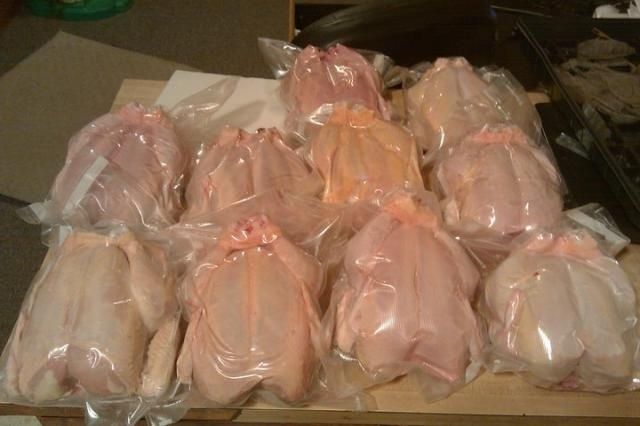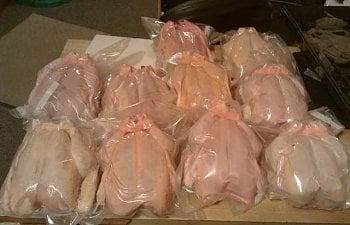Raising chickens to sell for meat can be a daunting task, when it comes to understanding the laws and regulations.
The best step to take is to contact your state Agriculture Department. The employees are knowledgeable and will know if your state follows the USDA exemptions or if you must follow additional laws for your state. It's better to have an idea on what you want to do, and discuss with your state Ag contact than to make assumptions that could potentially cause you to lose your flock and money.
First, this here is the article from the USDA for determining if you need to have your poultry processed at a licensed facility and what laws you need to follow:
Guidance for Determining Whether a Poultry Slaughter or Processing Operation is Exempt from Inspection Requirements of the Poultry Products Inspection Act
Obviously this is a big, complex document. Most people who raise poultry for meat fall under a few of the exemptions. I've cut these out of the document and listed below:
Personal Use Exemption - This means you can process your own poultry for your own family without needing to take them to a facility to process. Six items need to be met. There is no limit to how many chickens you can process this way - but it does mean you can't sell the chickens.
The best step to take is to contact your state Agriculture Department. The employees are knowledgeable and will know if your state follows the USDA exemptions or if you must follow additional laws for your state. It's better to have an idea on what you want to do, and discuss with your state Ag contact than to make assumptions that could potentially cause you to lose your flock and money.
First, this here is the article from the USDA for determining if you need to have your poultry processed at a licensed facility and what laws you need to follow:
Guidance for Determining Whether a Poultry Slaughter or Processing Operation is Exempt from Inspection Requirements of the Poultry Products Inspection Act
Obviously this is a big, complex document. Most people who raise poultry for meat fall under a few of the exemptions. I've cut these out of the document and listed below:
Personal Use Exemption - This means you can process your own poultry for your own family without needing to take them to a facility to process. Six items need to be met. There is no limit to how many chickens you can process this way - but it does mean you can't sell the chickens.
- The slaughtered and processed poultry is for the private use of the owner, their family or their guests.
- The slaughter and processing of the poultry is performed by the grower/producer/owner
- The poultry is healthy when slaughtered
- The poultry is slaughtered and processed under sanitary conditions and practices that result in poultry products that are sound and fit for human food
- The exempt poultry is not sold or donated for use as human food; and
- The shipping containers (packaging if you're sending it somewhere) bear:
- a.the producer’s name,
- b.the producer’s address, and
- c.the statement, Exempt P.L. 90-492.
- The custom slaughterer does not engage in the business of buying or selling poultry products capable for use as human food;
- The poultry is healthy when slaughtered;
- The slaughter and processing at the custom slaughter facility is conducted in accordance with sanitary standards, practices, and procedures that produce poultry products that are sound, clean, and fit for human food (not adulterated);
- The custom slaughtered or processed poultry is for the personal use of the grower/owner of the poultry – the grower/owner of the custom slaughtered or processed poultry may not sell or donate the custom slaughtered poultry to another person or institution; and
- The shipping containers (packaging if you're sending it somewhere) bear:
- a.the owner’s name,
- b.the owner’s address, and
- c.the statement, “Exempt P.L. 90-492”
- The poultry grower slaughters no more that 1,000 healthy birds of his or her own raising in a calendar year for distribution as human food;
- The poultry grower does not engage in buying or selling poultry products other than those produced from poultry raised on his or her own farm;
- The slaughter and processing are conducted under sanitary standards, practices, and procedures that produce poultry products that are sound, clean, and fit for human food (not adulterated);
- The producer keeps records necessary for the effective enforcement of the Act [Title 9 CFR 381.175] (this would mean recording dates of purchase and sale, who the chicks were purchased from, who bought the meat, and the weights of the processed chickens).
- The poultry products do not move in commerce (across state lines).
Always contact your state Ag Department representative first to determine if your state follows the USDA exemptions!



